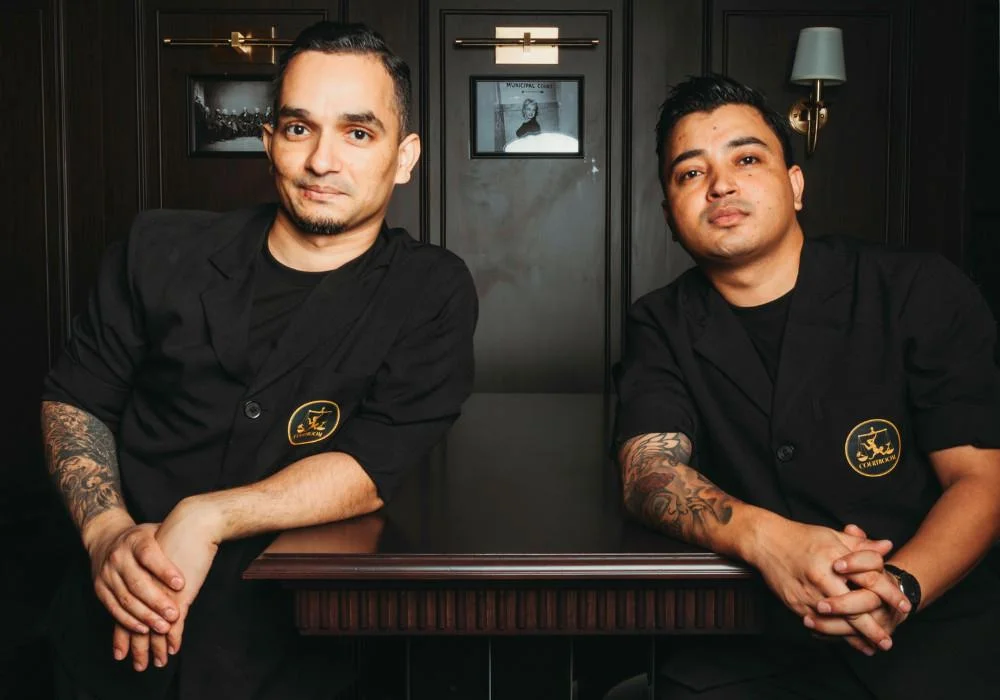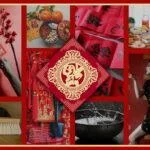On Graham Street’s lively slope, Courtroom adds a playful twist to Hong Kong’s bar scene, thanks to co-founders Saan Dhakal and Ranjeet Khatri, two veterans with serious mixology credentials. At first glance, the dark wood interiors, Lady Justice statue, and framed courtroom-themed art give the space an air of authority – but don’t be fooled. Inside, it’s all about contrasts, with cheeky props like gavels for photo ops and a monkey-swinging-from-scales logo that hints at the lighthearted experience ahead. As this month’s Friday Club Insider(s), we chat with the duo behind this imaginative concept to uncover the story behind their vision and their plans to champion social sustainability.
Read More: Friday Club. Insider – Chef Nobu Matsuhisa Explores His Legacy And Enduring Connection To Hong Kong
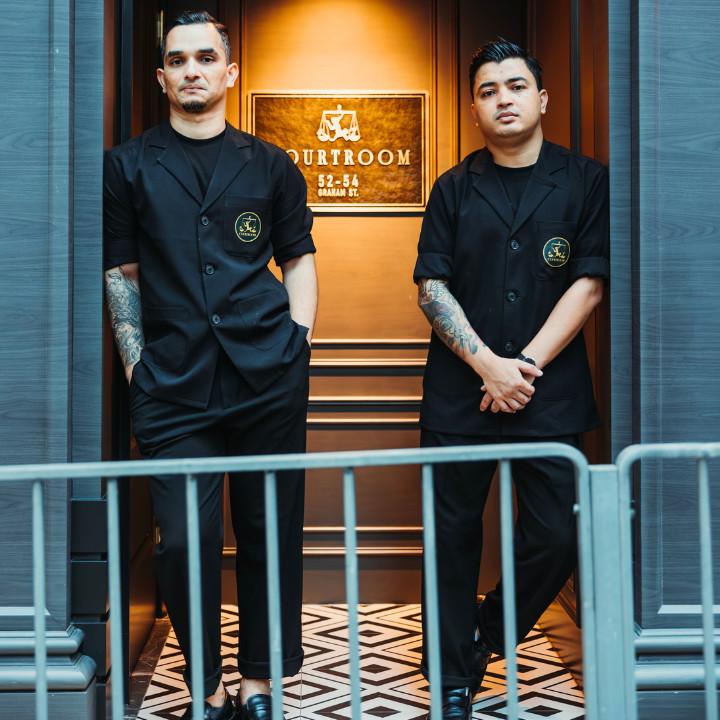
How did you two first meet, and when did you really start to connect?
Ranjeet: We’ve always known each other, but we didn’t hang out much until a trip to Singapore. That’s where it all started. We ended up drinking together after all the bars had closed – we found one place still open, and that’s where we really hung out for the first time.
Saan: I still remember seeing his face properly for the first time and thinking, ‘Oh, this is different’. We ended up talking a lot that night. I was feeling pretty good, but by 4am, they finally convinced me to have another drink. I gave in and joined them – it was one of those moments you don’t forget.
Ranjeet: In Hong Kong, we never really had the chance to hang out like that, even though we worked so closely together. But Singapore felt special for us – it was like a ‘honeymoon’ for our friendship.
Can you share what motivated you to pursue this project together?
Saan: Long story short, over the past two years – about a year and a half since he left Tell Camellia, and I also moved on – we decided to work together. People used to say he’s like my younger brother, and honestly, we’ve always had a lot of respect and fondness for each other. Even though we have very different personalities, they complement each other perfectly for what we do now, especially in the realm of education.
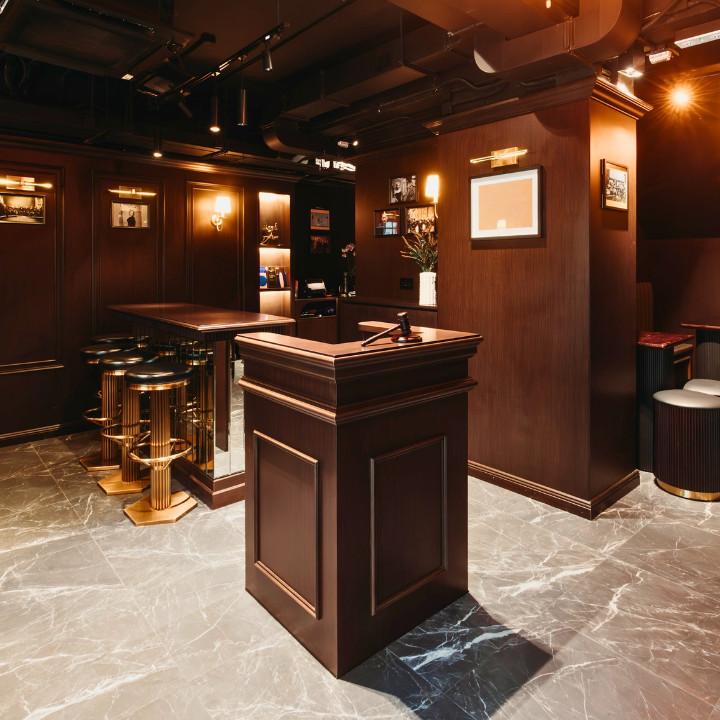
Your theme is unique – what was your inspiration behind it, and what kind of experience are you hoping to create?
Ranjeet: The concept for this bar has been in the works for some time. We wanted to create something that feels contradictory. The venue itself looks serious, right? But then, we have monkeys everywhere – literally. We love the playful chaos they represent, and we’re leaning more into that theme.
Saan: The goal has always been to create something unique. We’ve spent years learning and wanted to put everything we’ve experienced into this space – something nobody has really tried before. It’s a bit of a risky concept.
There’s a story from when we registered our business. We were advised to have an official representative, so we asked one of our closest friends – who happens to be a lawyer – to step in for us. That experience reinforced our focus on blending the serious with the playful, which is central to our concept.
The venue is also inspired by infamous court cases – not to point fingers or take sides, but because there’s something fascinating about the public’s obsession with these figures. Even when people know someone has done something wrong, they remain captivated.
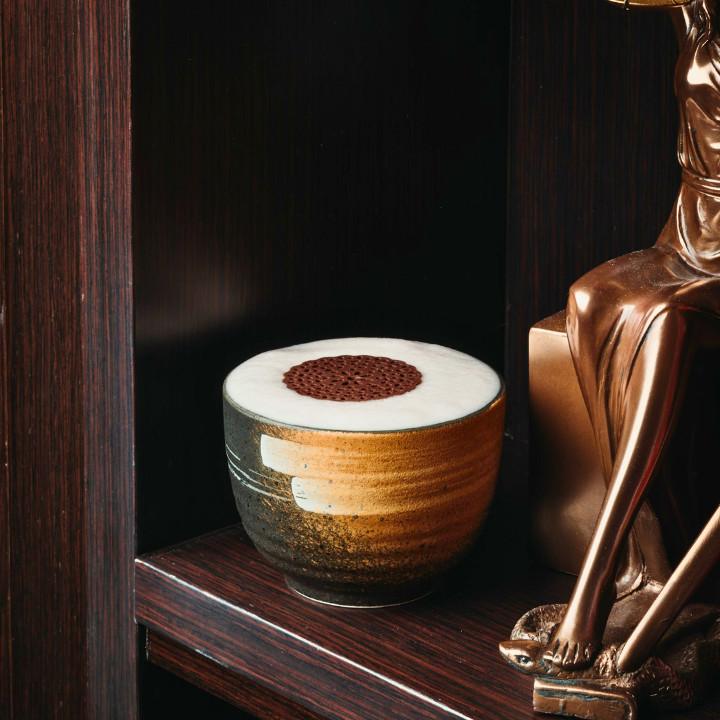
Your cocktail ingredients, from pizza-dough tequila to laksa leaf, are quite unconventional. What inspires your ingredient choices?
Saan: Every cocktail on our menu is built around the idea of contradiction – what you see on the menu isn’t what you expect when you taste it. The ingredients we source are familiar to some, but not something you’d typically find in most Hong Kong bars. We aim to make the cocktails experimental, surprising, and offer our guests a unique experience they’ve never had before.
That’s why we incorporate ingredients like wasabi and bitter gourd, for example. The whole concept is about pushing boundaries with fresh, hand-picked elements that challenge expectations.
The downstairs lab seems like a fascinating space. Can you share how you envision this space supporting mixology innovation?
Ranjeet: This ties into the idea of social sustainability. In the near future, we’ll be opening up the space to local and international bartenders. We’ll have books and resources available, and if they’re interested in learning about new equipment or techniques, the space will be open – tentatively from 2pm to 6pm (though the exact timing is yet to be confirmed). The idea is to provide a welcoming spot where bartenders on their break can drop by, grab a coffee or a mocktail, and explore the tools we have. It’s all about fostering a sense of community and sharing knowledge.
Saan: The whole idea behind this lab is to create our own experimental cocktails while also inspiring and supporting the next generation – especially within our own industry. That’s why we’ve equipped it with a wide range of laboratory gadgets.
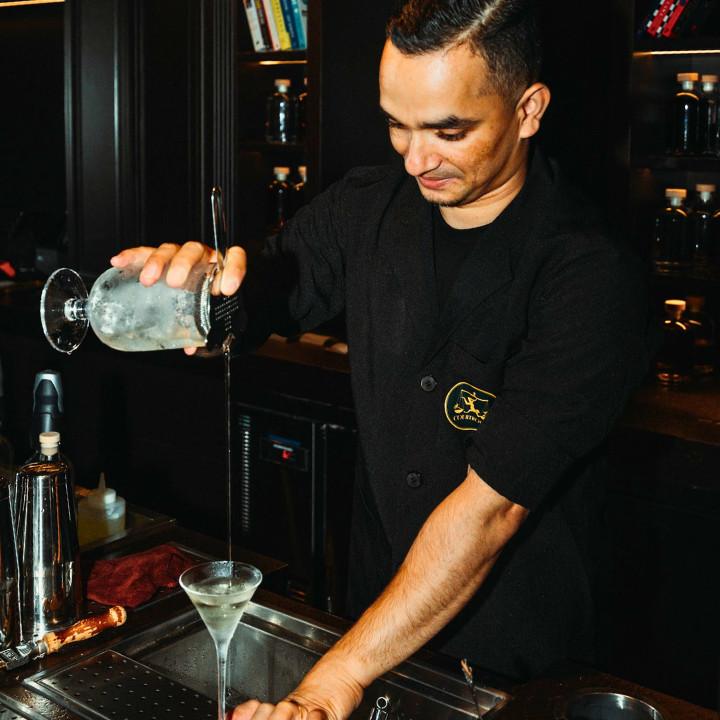
What does ‘social sustainability’ mean to you, and how did it become a foundational part of your bar’s identity?
Saan: In our industry, sustainability has been a major topic for the past decade – globally, locally, everywhere. I also come from a sustainability background, so when we decided to open this bar, we thought, why not take it a step further? Instead of focusing on food waste or locally sourced ingredients, we wanted to shift the conversation toward people. The theme of the bar is all about people – our ‘code,’ so to speak. That’s why we’re moving forward by highlighting social sustainability. For us, that starts within our own F&B community – our bartenders, servers, waitstaff, and so on. When we talk about social sustainability, it’s all about people. That’s the heart of what we’re trying to achieve.
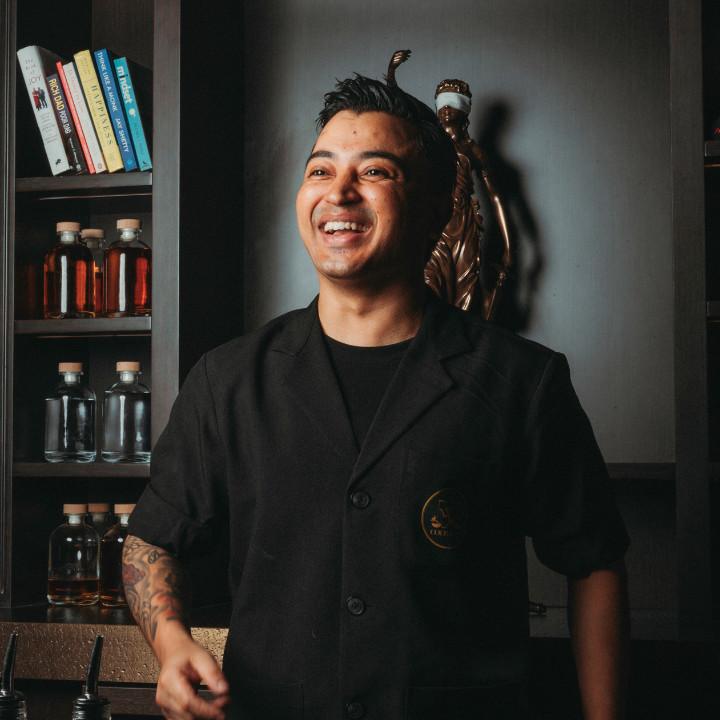
Are there any initiatives you hope to expand in the coming years?
Ranjeet: Right, so coming back to social sustainability, we’re planning to do a few things at the venue and increase donations to people in need. We’ve connected with a few organisations that will help us make this happen. We also want to show that even something like opening a bar can create a positive impact beyond the industry. For example, with our merchandise sales, not all the profits will stay with us. We’ll be donating a percentage – sometimes on a monthly basis or from specific events or merchandise sales.
Saan: That said, our primary focus is still on the F&B side of things. We believe if you can’t take care of your home base, you can’t take care of the outside world. So, we’re making sure to strengthen our foundation first. Once that’s steady, we’re excited to extend our efforts outward. It’s something we weren’t fully aware of before opening the bar, but we’ve come to realise just how many people in Hong Kong – like asylum seekers, domestic helpers, and underprivileged children – are in difficult situations. We’re really eager to make a meaningful contribution through our partnerships.
Follow Courtroom on Instagram to stay up-to-date on their latest events, menus, and collaborations.

Catherine Pun
A Hong Kong native with Filipino-Chinese roots, Catherine infuses every part of her life with zest, whether she’s belting out karaoke tunes or exploring off-the-beaten-path destinations. Her downtime often includes unwinding with Netflix and indulging in a 10-step skincare routine. As the Editorial Director of Friday Club., Catherine brings her wealth of experience from major publishing houses, where she refined her craft and even authored a book. Her sharp editorial insight makes her a dynamic force, always on the lookout for the next compelling narrative.

